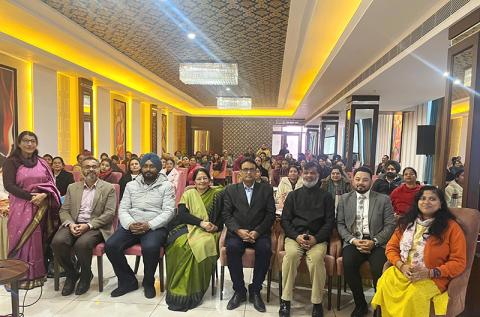Empowering Educators for Environmental Action: TSF-TERI Green School Workshop Inspires Sustainability in Ludhiana

Ludhiana, December 23, 2024: 'The Green School,' an initiative for uniting the efforts of the Tata Steel Foundation (TSF) and The Energy and Resources Institute (TERI) towards creating environment awareness among the school children and developing their knowledge in this area. Launched in April 2017, this initiative seeks to cultivate critical thinking, interdisciplinary learning, and a comprehensive grasp of environmental preservation among students within Tata Steel's operational areas. By interweaving themes like Energy, Water, Forest & Biodiversity, and Waste with Climate Change and Sustainable Development Goals (SDGs), 'The Green School' empowers the youth to champion our planet's well-being by instigating behavioural transformations.
In the preceding phase, the schools made remarkable strides, establishing Environment Management Committees (EMCs) and broadening their influence through collaborations with nearby communities. A pinnacle achievement was the active participation of our students at the 'World Sustainable Development Summit 2024' in Delhi, where they showcased leadership towards creating a greener tomorrow.
The Green School is dedicated to nurturing young minds and inspiring them to initiate awareness and action projects within their educational institutions and communities. Leveraging the insights gained through EMCs, these young scholars endeavour to devise sustainable solutions. Central to the initiative is the ongoing enrichment of teachers’ capacities. Since the initiation, teacher training sessions has been organised covering learning modules, gamification, Sustainable Leadership program, thematic sessions, and more.
The primary objective of the workshop was deepening teachers’ comprehension of the project, reinforcing their knowledge, and cultivating collaborative ideas for embracing environmentally sustainable practices. It is crucial to highlight that a variety of resource materials were meticulously conceived, developed, and disseminated to aid instructors in grasping diverse approaches to effectively address environmental issues with children as part of their regular teaching and learning process, thereby facilitating behaviour change. These resources will also contribute to enhancing student engagement in addressing these significant issues.
Welcoming the audience and the guests Ms Sumana Singh, Unit Lead, Ludhiana, Tata Steel Foundation, said, “The merit of the Green School project and how environment education will now be a part of the daily teaching- learning processes in schools of the Ludhiana East under the ongoing TSF- TERI partnership.”
The workshop was graced by Dr Neelima Jerath, Former DG- PSCST & Pushpa Gujral Science City as the keynote speaker. Addressing the teachers Dr Jerath explained, “Environment education programme even at a primary level is bound to lead to a sensitive population of future citizenry.” Further, she presented a range of EE activities ongoing in the state of a Punjab and congratulated TSF and TERI for this prestigious event.
Addressing the audience Mr Manoj Kumar Gupta, Chief Finance & Accounts, Tata Steel, Ludhiana, highlighted, “The genesis of the TATA industry in Punjab region and environment protection will be a thumb rule, the CSR activities will reinforce a public acceptance and universal living conditions of the populations directly linked with the industry.”
The first session was on Water security & sustainability by Mr Anshuman, Director, Water Resources Division, TERI. This session focused on understanding sustainable and traditional methods of water conservation and utilisation in context with western India focusing on Punjab. Mr Anshuman connected the teachers with some field examples and brought forward data linked understanding of the water resource in the state of Punjab. He emphasized, “A continuous monitoring and evaluation of parameters is essential to keep the pollution under control.”
The second expert session was taken by Dr Avneet Pal Singh, Punjabi University, Patiala on understanding importance of biodiversity. Having in depth knowledge of biodiversity, Dr Avneet explained, “There is a strong interdependence and coexistence of human and nature.” Sharing examples from the Ludhiana itself, he explained the rich biodiversity & culture of Punjab and the changing trends.
Dr Livleen Kahlon, Associate Director, Environment Education & Awareness, TERI, during the session emphasized, “There is a need for expansion of school activities to the community level for a sustainable impact.” She also stressed, “There is a need to scale up activities to a global level while retaining the impact at a local stage.” Highlighting the role of gamification in environmental education, Dr Livleen demonstrated how it can make the teaching and learning of concepts effortless for students and facilitators. Teachers then worked in groups to brainstorm and develop a game to help students engage in critical and interdisciplinary thinking on environmental issues, linking it with the curriculum.
Hands-on training for teachers on composting, bioenzyme preparation through waste food peel/leftovers was done with the teachers. The demonstrated activities were easy to comprehend and can be implemented by school children at both individual and community levels.
The workshop, highly insightful, witnessed the enthusiastic participation of approximately 76 teachers from primary, middle, high & secondary schools of Ludhiana East, Ludhiana, Punjab. Teachers were motivated to adopt the techniques discussed and demonstrated during the workshop in their daily lives, working towards a greener and cleaner environment.
Other dignitaries in the workshop were; Mr Jasvir Singh, District Coordinator, Secondary Education; Mr Jaswinder Singh, deputy DEO Secondary Education, Mr Manoj Kumar, DEO Primary, Ludhiana East and Mr Gurukripal Singh, District Guidance Counsellor, Ludhiana.
The Green School workshop in Ludhiana successfully empowered educators with innovative tools and knowledge to promote environmental sustainability. It reinforced the critical role of education in driving meaningful change at both local and global levels.
